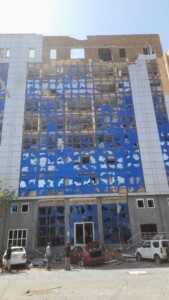Sudan: River Nile tribal leaders arrested on suspicion of corruption

Sudanese Pounds (File photo: Andrew Bergman / RD)
The leader of El Angeryab tribe, Ibrahim Osman, has been arrested by authorities in River Nile state, along with several local officials, on suspicion of corruption involving community funds from mining companies and the now disbanded National Congress Party (NCP) that ruled Sudan during the deposed Al Bashir regime.
Omda Ibrahim Osman was reportedly arrested in El Bawga, north of the state capital Atbara, along with El Sir Osman, Mohamed Ibrahim, and several local officials yesterday.
A witness told Radio Dabanga, reported that from 10 am on Saturday, the authorities conducted campaign of arrests, targeting tribal leader Ibrahim Osman, his brother El Sir, several native administration* members, and Mohamed Ibrahim, the medical director of El Bawga Hospital. Reports indicate that they may be transferred to Port Sudan.
The authorities also issued orders to arrest Adel Mustafa, Siddig El Dali, and Mohamed Khalid. Efforts are underway to locate and arrest them in the Fitawar area, approximately 20 kilometres from El Bawga.
Activists warn that the conflict could escalate into more dangerous phases and might take on a tribal dimension. This is linked to the investigation into community responsibility funds from mining companies. One activist told Radio Dabanga that all those arrested had approached the governor, Mohamed Abulguroun, regarding the funds and their allocation.
According to a witness, Mohamed Ibrahim, the director of El Bawga Hospital, stated that funds from mining companies for community contributions were received by the head of the community committees, who is also the head of the dissolved NCP.
The arrests are seen as an attempt to incite tribal conflict between the community and the governor and Islamist elements. The region’s tension could necessitate the governor’s dismissal and the restructuring of committees. The detainees had demanded that the governor halt the operations of mining companies and dissolve the mining committees.
Additional arrests
Another eyewitness informed Radio Dabanga that the authorities conducted a widespread arrest campaign among the youth in the El Bawga area. He reported seeing a large security convoy near the ferry, consisting of about 20 pickup trucks, commonly known as a “Thatcher”, surrounding the area. He observed approximately ten young men lying face down in the back of the last vehicle, but was unable to discern their features.
Previously reporting, a source speaking to Radio Dabanga confirmed the poor state of the Port Sudan Prison, emphasising the urgent need for better health care and living conditions. Reports indicate a widespread campaign of arrests and illegal detentions without judicial orders in cities across states like Sennar, White Nile, Kassala, and El Gedaref. Conditions in the Port Sudan Prison are also reported to be dire, with overcrowding, disease outbreaks, and severe shortages of food and water.
Critical voices and political opponents of the Sudanese Armed Forces (SAF), including Sheikh Mousa Burma, who called for peace, face detentions throughout Sudan at the hands of Military Intelligence or security forces. Detainees have been accused of supporting the Rapid Support Forces (RSF) or other opponents of the army, often with little to no evidence.
* The Native Administration was instituted by British colonial authorities seeking a pragmatic system of governance that allowed for effective control with limited investment and oversight by the state. The state-appointed native administration leaders also took on new responsibilities for executing policies, collecting taxes, and mobilising labour on behalf of the central government. According to the Darfur Bar Association (DBA), Sudan’s native administration during the 30-year rule of dictator Omar Al Bashir did not represent the real community leaders.











 and then
and then